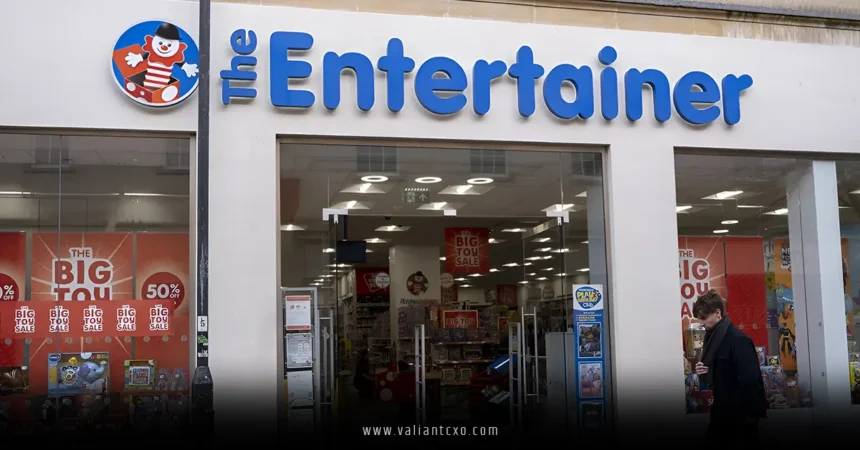Entertainer toy shop employee ownership is more than just a buzzword—it’s a revolutionary approach that’s shaking up the retail world. Imagine a toy store where every employee isn’t just stocking shelves or ringing up sales but has a real stake in the company’s success. Sounds like a dream, right? Well, for The Entertainer, the UK’s largest independent toy retailer, this dream is now reality. By transitioning to an Employee Ownership Trust (EOT), they’ve handed the keys to their 1,900 employees, giving them a share of the profits and a voice in the company’s future. But what does entertainer toy shop employee ownership really mean, and why should you care? Let’s dive into this fascinating model, explore its benefits, challenges, and what it could mean for the future of retail.
What Is Entertainer Toy Shop Employee Ownership?
A New Way to Run a Business
Entertainer toy shop employee ownership is a business model where the company’s shares are held in a trust for the benefit of its employees. Instead of a single owner or corporate giant calling the shots, the workforce collectively owns the business through an EOT. For The Entertainer, this means all 1,900 employees, from cashiers to managers, are now stakeholders. They don’t have to buy shares themselves—the trust holds the shares on their behalf, and they reap the rewards through profit-sharing and decision-making influence.
Think of it like a big family picnic where everyone gets a slice of the pie, not just the person who baked it. This setup creates a sense of unity and purpose, as every employee has a reason to care about the company’s success. It’s not just about selling toys; it’s about building a legacy together.
How Did The Entertainer Make the Switch?
The journey to entertainer toy shop employee ownership began with its founder, Gary Grant. After building the company from a single shop in 1981 to over 160 stores across the UK, Gary faced a tough question: what happens when I retire? He could’ve sold to a corporate giant, but that risked losing the company’s heart—its family values, Sunday closures, and charitable giving. Instead, he chose an EOT to preserve the culture and reward loyal employees.
This wasn’t a snap decision. It took years of planning to ensure a smooth transition. The EOT model allows the Grant family to be paid out over time from company profits, balancing financial fairness with the company’s long-term stability. It’s like planting a tree today that’ll provide shade for generations.
Why Choose Entertainer Toy Shop Employee Ownership?
Preserving a Legacy
Why would a successful business like The Entertainer opt for employee ownership? For starters, it’s about legacy. Gary Grant didn’t want his life’s work to be gobbled up by a faceless corporation that might close stores or change the company’s values. Entertainer toy shop employee ownership ensures the business stays true to its roots—think of it as passing the baton to a trusted team rather than selling it to the highest bidder.
Rewarding Loyalty
With nearly 400 employees serving over a decade and 50 clocking in at 20 years or more, The Entertainer has a loyal workforce. Entertainer toy shop employee ownership is a thank-you note written in profits. Employees get tax-free bonuses based on the company’s performance, expected to start in January 2027. It’s like giving every worker a golden ticket to share in the company’s success.
Avoiding Corporate Takeovers
Selling to a big corporation could’ve meant job cuts, store closures, or a shift away from the company’s ethical stance. Entertainer toy shop employee ownership keeps control in the hands of those who know the business best—the employees. It’s a shield against the corporate sharks circling for a quick profit.
Benefits of Entertainer Toy Shop Employee Ownership
Financial Perks for Employees
One of the biggest draws of entertainer toy shop employee ownership is the financial upside. Employees share in the company’s profits through annual bonuses, which can be tax-free up to a certain limit in the UK. Imagine working hard all year, knowing that a successful holiday season could mean a nice bonus in your pocket. It’s not just a paycheck—it’s a stake in the game.
A Voice in Decision-Making
Entertainer toy shop employee ownership isn’t just about money; it’s about power. Employees get a say in major decisions through elected representatives and trust governance. Ever felt like your ideas at work go unheard? With this model, employees have a megaphone, ensuring their voices shape the company’s future.
Boosted Morale and Engagement
When you own a piece of the pie, you’re more likely to care about how it’s baked. Entertainer toy shop employee ownership fosters a sense of pride and purpose. Employees aren’t just clocking in—they’re invested in making the business thrive. This can lead to better customer service, innovative ideas, and a workplace that feels like a team, not a hierarchy.
Job Security
In a retail world where layoffs and store closures are all too common, entertainer toy shop employee ownership offers a layer of protection. The EOT model makes it harder for the business to be sold without employee consent, giving workers stability in an unpredictable industry. It’s like having a safety net woven by the team itself.
Challenges of Entertainer Toy Shop Employee Ownership
Funding Hurdles
While entertainer toy shop employee ownership sounds like a win-win, it’s not without challenges. Raising capital can be trickier, as EOTs often rely on internal profits rather than external investors. Imagine trying to expand a store while relying solely on your savings—it’s doable, but it requires careful planning.
Slower Decision-Making
With more voices at the table, decisions can take longer. Entertainer toy shop employee ownership means balancing employee input with operational efficiency. It’s like trying to get a big group to agree on where to eat dinner—everyone has an opinion, and it can slow things down.
Managing Expectations
Not every year will bring blockbuster profits. Employees expecting big bonuses might face disappointment in lean times. Entertainer toy shop employee ownership requires clear communication to keep morale high, even when the toy market takes a hit. It’s about setting realistic expectations while keeping the team motivated.
How Entertainer Toy Shop Employee Ownership Compares to Other Models
The Entertainer vs. John Lewis Partnership
The Entertainer isn’t the first UK retailer to embrace employee ownership. The John Lewis Partnership, with its 78,000 employees, is the gold standard. Both companies use similar models, but there are differences. Entertainer toy shop employee ownership focuses on a smaller, toy-specific workforce, while John Lewis spans department stores and groceries. The Entertainer closes on Sundays, a unique value not shared by John Lewis. It’s like comparing a cozy family diner to a sprawling restaurant chain—both serve great food, but the vibe is different.
Employee Ownership vs. Traditional Models
Traditional corporate ownership often prioritizes shareholder profits over employee well-being. Entertainer toy shop employee ownership flips this script, putting workers first. Unlike publicly traded companies, where decisions might prioritize stock prices, the EOT model aligns with long-term stability and employee benefits. It’s the difference between a sprint for quick cash and a marathon for lasting impact.
The Future of Entertainer Toy Shop Employee Ownership
Strengthening Market Presence
With entertainer toy shop employee ownership, The Entertainer is poised to strengthen its market presence. Partnerships with Tesco and Matalan already give it a leg up, and employee ownership could drive innovation in product offerings and customer service. Imagine a toy store where every employee is motivated to go the extra mile—it’s a recipe for standing out in a crowded market.
Inspiring Other Retailers
The success of entertainer toy shop employee ownership could spark a trend. If The Entertainer thrives, other retailers might follow suit, adopting EOTs to boost morale and loyalty. It’s like a ripple effect—one company’s bold move could reshape the retail landscape.
Maintaining Values
The Entertainer’s commitment to closing on Sundays and donating 10% of profits to charity is at the heart of its identity. Entertainer toy shop employee ownership ensures these values endure, as employees who share these principles guide the company’s future. It’s like entrusting your home to family members who cherish it as much as you do.
How Can Other Businesses Adopt Entertainer Toy Shop Employee Ownership?
Steps to Transition to an EOT
Thinking of following The Entertainer’s lead? Transitioning to an EOT requires careful planning. First, assess your company’s financial health—EOTs need sustainable profits to fund payouts. Next, engage legal and financial experts to set up the trust. Finally, communicate clearly with employees to ensure buy-in. It’s like building a house—you need a strong foundation, skilled builders, and a clear blueprint.
Lessons from The Entertainer
The Entertainer’s success with entertainer toy shop employee ownership offers lessons for others. Prioritize culture, reward loyalty, and plan for the long term. It’s not about quick wins but about creating a business that thrives for decades. Think of it as planting a garden—you won’t see blooms overnight, but with care, it’ll flourish.
Why Entertainer Toy Shop Employee Ownership Matters
Entertainer toy shop employee ownership isn’t just a business model; it’s a statement. It says employees are more than cogs in a machine—they’re partners in a shared journey. This approach could redefine retail, making it more human, more connected, and more sustainable. Whether you’re a customer buying a toy or an employee stocking the shelves, this model creates a win-win. It’s a reminder that businesses can do well by doing good.
For more insights on employee ownership, check out The Employee Ownership Trust Guide from the UK government, John Lewis Partnership’s Ownership Model for a comparison, or Retail Week’s Analysis for industry trends.
Conclusion
Entertainer toy shop employee ownership is a bold step into the future of retail. By giving employees a stake in the company, The Entertainer is fostering loyalty, boosting morale, and preserving its unique culture. While challenges like funding and decision-making exist, the benefits—financial rewards, job security, and a stronger voice—make it a model worth watching. This isn’t just about selling toys; it’s about building a community where everyone has a share in the success. So, next time you walk into a toy store, think about the people behind the counter—they might just be the owners, working to make your experience unforgettable. Ready to see more businesses follow this path? The Entertainer is leading the way, and the retail world is taking notice.
FAQs
1. What exactly is entertainer toy shop employee ownership?
Entertainer toy shop employee ownership refers to The Entertainer’s use of an Employee Ownership Trust (EOT), where the company’s shares are held in a trust for the benefit of its 1,900 employees. This allows workers to share profits and influence decisions without buying shares themselves.
2. How does entertainer toy shop employee ownership benefit workers?
It offers financial rewards through tax-free profit-sharing bonuses, a stronger voice in company decisions, and increased job security. Employees feel more valued and motivated, knowing they’re stakeholders in the business.
3. Why did The Entertainer choose employee ownership?
Founder Gary Grant chose entertainer toy shop employee ownership to preserve the company’s values, reward loyal employees, and avoid a corporate takeover that could disrupt its culture or lead to job losses.
4. Are there risks to entertainer toy shop employee ownership?
Yes, challenges include potential funding limitations and slower decision-making due to increased employee input. However, The Entertainer’s debt-free status and experienced leadership help mitigate these risks.
5. Can other businesses adopt entertainer toy shop employee ownership?
Absolutely! Other companies can transition to an EOT by assessing financial health, setting up a trust with expert help, and engaging employees. It’s a model that prioritizes long-term stability and worker involvement.
Read Also:valiantcxo.com


